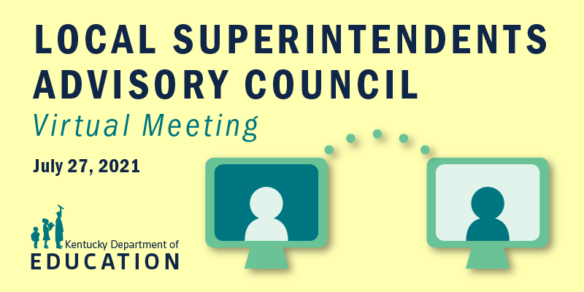
The Kentucky Department of Education’s (KDE’s) Local Superintendents Advisory Council (LSAC) conducted its regular meeting on July 27 to approve several regulations and amendments, including a new regulation governing how the student and teacher representatives for the Kentucky Board of Education (KBE) will be selected.
The regulation follows House Bill 178, which was signed into law in April and requires that both the student and teacher members on the KBE must be non-voting members, serve one-year terms and rotate among each of Kentucky’s six congressional districts.
Since current student member Solyana Mesfin is from the 3rd District, and Allison Slone, the current teacher member, is from the 5th District, the next student and teacher members will be from the 4th and 6th districts, respectively.
The teacher and student members cannot come from the same congressional district during the same term, and the student must be a junior at the time of the appointment. The legislation also stated that the KBE must promulgate an administrative regulation for that appointment process.
“This administrative regulation is primarily about filling in the details of how this process will work, when those terms will begin and the selection process,” said Chuck Truesdell, KDE’s director of government relations.
According to the proposed regulation, applications for student and teacher positions would open no later than March 1 and close no later than April 1 each year. Submitted applications would go to the Student Advisory Council and Teacher Advisory Council for review, and each group would choose three applicants to recommend to KBE by May 1.
During their last meeting of the fiscal year – typically in June – KBE members would choose their final recommendations for the positions. The selected student and teacher would take their seat as non-voting members of KBE on July 1.
LSAC members approved this regulation, and it will go to KBE for consideration at its next regular meeting on Aug. 5.
Approval of emergency amendment 702 KAR 7:125E
Robin Kinney, associate commissioner in KDE’s Office of Finance and Operations, discussed a proposed emergency amendment to regulation 702 KAR 7:125.
The amendment allows a district to provide educational services to students while quarantined or isolated and allows school districts to include those students in the Adjusted Average Daily Attendance (AADA) during the 2021-2022 school year.
“In spite of your best efforts, if we still have students that are going to be quarantined, we wanted to try and propose a way that you could still receive funding for those students in a quarantined situation,” said Kinney.
The amendment allows a district to provide educational services to students while quarantined or isolated.
“Generally speaking, you have students that are asymptomatic, they are still capable, and you are still capable of delivering instruction to them,” said Kinney. “We want that instruction to occur, whatever that looks like, by your local district.”
Update from the Commissioner
Education Commissioner Jason E. Glass provided LSAC members with an update on school reopening procedures.
During a July 26 media briefing, Gov. Andy Beshear unveiled new masking recommendations for the state’s K-12 schools in response to the highly contagious COVID-19 delta variant.
The governor’s recommendations include:
- School districts should require all unvaccinated students and unvaccinated adults to wear a mask when in classrooms and other indoor school settings;
- School districts should require all students under 12 years of age to wear a mask when in classrooms and other indoor school settings; and
- School districts wishing to optimize safety and minimize the risk of educational and athletic disruption should require all students and all adults to wear a mask while in the classroom and other indoor school settings.
Glass told LSAC members he understands the difficulty of heading into another school year still dealing with the virus and praised how they handled the challenges last year.
“The good news is that all of you know what to do,” he said. “You’ve proven over the past year that you can operate in person and do so in a safe way, and that the layers of virus mitigation strategies that you’ve put in place were effective.”
While the governor’s request regarding face masks remains a local decision, Glass encouraged the superintendents to continue to use virus mitigation strategies to keep their schools safe, such as getting vaccinated if able, wearing masks when needed, social distancing, handwashing, staying home when sick and contact tracing.




Leave A Comment